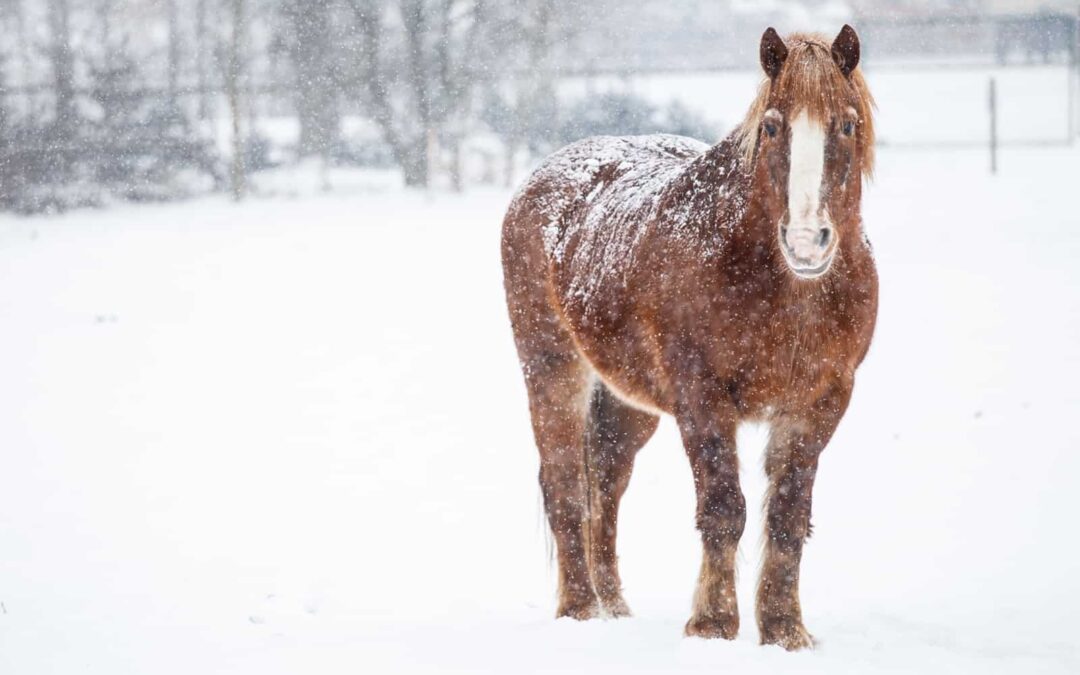LET’S GET READY FOR WINTER! The crops are in the barns for the year – irrigation water is shutting off – leaves are starting to fall off the trees, and…… it’s time to get ready for winter. October is a great month to prepare your horse for winter. Your horse’s body is gearing up for the cold by growing their hair coat and increasing their cortisol levels which encourages the horses body to put on fat to get ready for winter. This increase in cortisol levels also increases their appetite which might predispose them to bolting their food and choking.
DENTAL: This is a perfect time to check their teeth! Dental issues can prevent your horse from chewing its food and utilizing the nutrients effectively. Teeth issues can also predispose your horse to colic and choking. While your veterinarian checks their teeth, have them do a physical exam, and talk to them about parasite control, feeding, vaccinations, and other winter care issues.
WEIGHT: Watch your horse’s weight – I like to see horses going into winter being a normal weight or even a few pounds heavier. It is very hard to get horses to gain weight if they are thin going into the winter. A weight tape can be a great tool. Measure your horse around its girth area every few weeks to make sure that they aren’t losing weight. Also, a heavy hair coat can hide their body condition. Put your hands on your horse to check to make sure you can’t feel prominent ribs or backbone.
FEED: If you can store it, buy your hay for the winter – now is a great time, as many producers will run out during the winter leaving a mad dash to find hay. This will also help your horse by not changing its feed abruptly during the winter, which could cause a colic. Tarp your hay or store in a place to prevent it from getting wet and moldy. Feeding forage is the best option for most horses! Unless your horse has severe dental issues, most of their calories should come from good quality hay! The process of chewing and the digestion of the hay will help keep them warm during the winter! Horses are meant to eat 23/24 hours per day, so feed small quantities throughout the day – using this approach will help decrease the colic risk and help decrease stomach ulcers. The most popular hays in the Northwest include orchard grass, alfalfa grass, pasture mixes, timothy, Teff, and bluegrass. Horses that need to be fed a low sugar hay, due to metabolic syndrome, Cushing’s, or PSSM, should have their hay tested for sugar. Hays can vary greatly in sugar content dependent upon how and when they are harvested. A 1000# horse needs around 20,000 calories per day to maintain bodily functions. This means we need to feed 2-3 % of body weight – exercise, lactation, pregnancy, and cold weather will increase caloric needs. High grain based diets should be fed with caution. These include oats, barley, and corn. Small amounts, less than a pound, are fine for most horses as a treat. A lot of research in the last decade has shown that high grain diets significantly increases the risk of colic and of stomach ulcers.
WATER: Get your water tanks set up with heaters to ensure that your horses have clean, warm water available. Horses will drink warmer water in higher amounts than very cold water. Your horse needs to drink at least one gallon of water for every 100# of body weight on a daily basis. You can help increase water consumption by using salt – give 1 teaspoon daily or give electrolytes to increase water intake – this is especially helpful during a transition from very hot or very cold weather. Mashes using warm water and a forage concentrate in the winter will also help water consumption amounts. Increased water consumption can help decrease the risk of colic – so very worth it!
ENVIRONMENT: Check your property for leaves and plants that might be toxic. As pastures become eaten down, your horse might attempt to eat leaves or plants that they might not normally eat as the grass is less prevalent. Trim trees and check shelters and barns for any safety issues such as nails, etc.
Have a great, fun, and safe winter!
Trish Kentner, DVM Countryside Equine Clinic, P.C. Haystack Farm & Feeds, Inc

